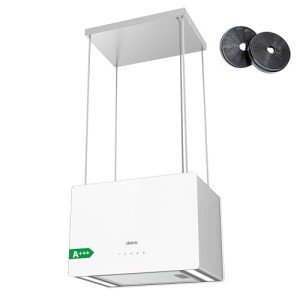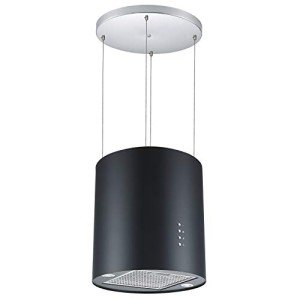9 . What Your Parents Taught You About Extractor Fan For Island Hob
ліёл¬ё

The Essential Guide to Extractor Fans for Island Hobs
In contemporary cooking areas, the island hob has emerged as a standout function, working as a focal point for culinary imagination and social gatherings. Nevertheless, with the arrival of open-plan living spaces, the need for reliable ventilation becomes vital. An extractor fan for an island hob is not simply a luxury; it's a necessity. This article will explore the factors you must think about installing an extractor fan, the types available, their functions, and the very best practices for setup and maintenance.

Why Install an Extractor Fan for Island Hobs?
Island hobs are typically located away from walls, making conventional overhead extraction hoods unwise. Here are some crucial reasons why an extractor fan is important for island hobs:
Air Quality Improvement: Cooking generates smoke, steam, and smells. An extractor fan successfully eliminates these pollutants, resulting in a cleaner kitchen environment.
Heat Reduction: Extractor extractor fan for island hob fans assist expel hot air, contributing to a more comfy cooking environment.
Defense Against Grease Build-Up: Continuous exposure to cooking fumes can result in grease accumulation on surfaces. An extractor fan alleviates this risk.
Visual Appeal: Many modern-day extractor fans are created to complement kitchen aesthetic appeals, ending up being trendy additions rather than eyesores.
Types of Extractor Fans
When choosing an extractor fan for an island hob, it's essential to consider the different types offered on the marketplace. Here are the most typical:
| Type | Description | Pros | Cons |
|---|---|---|---|
| Ducted | These systems vent air outside through a duct. | Highly reliable at getting rid of smells and smoke; enhances air quality. | Installation can be intricate; requires a course to exterior. |
| Ductless (Recirculating) | Filters air and recirculates it back into the kitchen. | Much easier to set up; no external vent needed. | Less reliable in getting rid of smoke and smells; needs frequent filter changes. |
| Downdraft | Retractable system placed behind the hob. | Discreet design; effective for island settings. | Fairly pricey; might not be as powerful as conventional hoods. |
| Wall-mounted | Similar to conventional hoods but developed to hang over islands. | Efficient and readily available in numerous designs. | Needs appropriate space; can block views. |
Key Features to Consider
When buying an extractor fan for an island extractor fans hob, there are a number of functions to remember to make sure ideal performance and satisfaction:
Suction Power: Measured in cubic meters per hour (m Ві/ h), this shows how effectively the fan can remove air. A higher ranking is normally chosen for efficient ventilation, especially in big, open spaces.
Sound Level: Measured in decibels (dBA), quieter designs are preferable for convenience, particularly in open-plan designs.
Filter Quality: Ensure the fan is geared up with premium filters (e.g., triggered carbon filters for ductless designs) that can be easily changed.
Control Options: Look for fans with user-friendly controls such as touchscreens, push-button controls, or clever features that permit smooth operation.
Energy Efficiency: Opt for energy-rated designs to reduce energy intake and long-term costs.
Installation Best Practices
Setting up an extractor fan requires mindful planning to optimize its efficiency. Here are some necessary pointers:
Positioning: Mount the fan 65-75 cm above the cooking surface area for optimum efficiency.
Adequate Ducting: If choosing a ducted fan, ensure that ducting is kept straight and as brief as possible to lessen airflow resistance.
Electrical Work: Hire a certified electrical contractor to guarantee that all electrical connections comply with security requirements.
Follow Manufacturer Guidelines: Adhere strictly to the installation guidelines provided by the producer to guarantee safety and performance.
Professional Installation: Where necessary, consult professional installers for complex systems, specifically those requiring duct work.
Upkeep Tips
To ensure long-lasting performance from your extractor fan, regular maintenance is important. Think about the following pointers:
Clean Filters: Depending on use, clean or replace filters month-to-month for optimal air quality.
Check Ducts: Regularly inspect ductwork for any obstructions or damage and clean as needed.
Fend Off Grease Buildup: Periodically wipe down surface areas to avoid grease accumulation.
Use a Soft Cloth: For regular cleaning, utilize a wet cloth and moderate detergent, avoiding abrasive materials.
Frequently asked questions
1. How do I select the right size extractor fan?
Identify the required airflow using the room size. Determine it based upon the kitchen's volume (length Г— width Г— height) and increase by 10 to 15 air modifications per hour.
2. Are ductless extractor fans effective?
While ductless fans are easier to set up, they are less effective compared to ducted systems. They can purify the air but may permit some smells to linger.
3. Can I install an extractor fan myself?
It is advisable to seek expert assistance for setup, particularly for ducted fans, as incorrect installation can result in decreased efficiency and safety threats.
4. How often should I change extractor fan filters?
For optimal performance, change or tidy filters every 1-3 months, depending upon cooking frequency and the type of filter.
5. Do extractor fans consume a lot of electricity?
Modern extractor fans are developed to be energy-efficient. Inspect the energy ranking before purchase to choose a more cost-effective alternative.
An extractor fan for island hob (click through the up coming internet page) fan for an island hob not just improves cooking experiences but likewise safeguards indoor air quality, contributing to a more pleasurable kitchen environment. By considering the types offered, important features, and proper setup and upkeep, homeowners can make educated decisions that match their needs. With the right extractor fan, cooking can be a pleasant and healthy leisure activity, devoid of concerns about air quality and convenience.

лҢ“кёҖлӘ©лЎқ0
лҢ“кёҖ нҸ¬мқёнҠё м•ҲлӮҙ